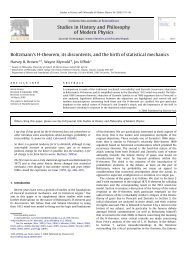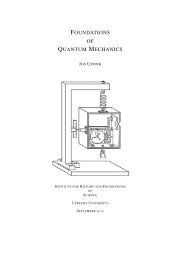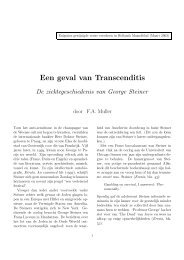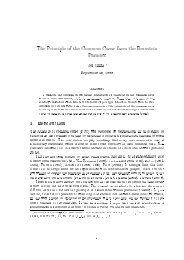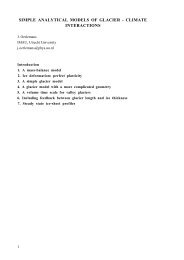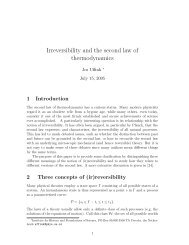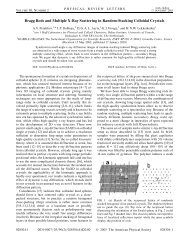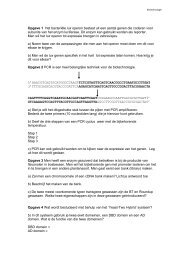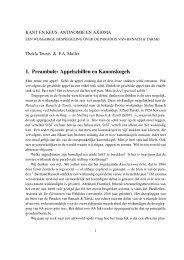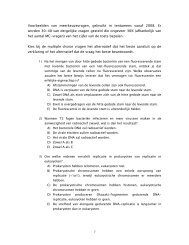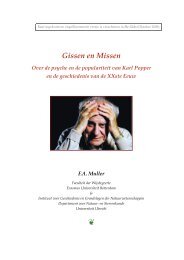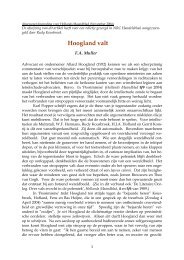Subjective probability and statistical physics
Subjective probability and statistical physics
Subjective probability and statistical physics
Create successful ePaper yourself
Turn your PDF publications into a flip-book with our unique Google optimized e-Paper software.
<strong>and</strong> gives the principle of insufficient reason a central role. Indeed, he explains the<br />
(analogue of) condition (10) as “nothing more than the expression of our state of<br />
complete ignorance of the causes of the errors [i.e. the deviation from the target] <strong>and</strong><br />
their mode of action” (Herschel 1850, p. 398, emphasis in the original). If Maxwell<br />
indeed borrowed so much from Herschel, it could be that he would also have approved<br />
of this motivation of condition (10).<br />
Now, Maxwell’s (1867) argument to derive the Maxwell distribution was much<br />
more detailed <strong>and</strong> a clear improvement upon his previous one. This is not to say that<br />
the tension between the intended frequency interpretation of f <strong>and</strong> the assumptions<br />
motivated by insufficient reason, i.e. by appealing to the absence of reasons to assume<br />
otherwise, disappeared. However it would take me to far afield to analyse this<br />
argument. (See Uffink (2007, section 3.3) for more details.)<br />
4.1 Boltzmann<br />
Although the work of Ludwig Boltzmann made a profound contribution to the development<br />
of <strong>statistical</strong> <strong>physics</strong>, in this paper his work will only receive brief attention,<br />
because Boltzmann never championed a subjective view on <strong>probability</strong>. One ought<br />
to realize that even in the late 19th century, <strong>probability</strong> theory was not yet a subject<br />
commonly taught at universities, <strong>and</strong> Boltzmann was not exposed to any course on<br />
the theory as a student, nor is there any evidence that he read classical works like<br />
Bernoulli or Laplace. Instead, he seems to have derived his underst<strong>and</strong>ing of <strong>probability</strong><br />
from Maxwell, mixing this with ideas of his own or perhaps derived from other<br />
sources. In any case, one does not see him mentioning or referring to any work on<br />
<strong>probability</strong> theory until the late 1890’s (when he cited the book by Von Kries).<br />
Nevertheless, it is clear that Boltzmann had less patience with the classical, subjective,<br />
notion of <strong>probability</strong> than Maxwell. Indeed, one of the few instances in which<br />
he criticised Maxwell was precisely Maxwell’s (1867) appeal to Insufficient Reason<br />
(Boltzmann 1872). For Boltzmann, <strong>probability</strong> was an objective quantity. However,<br />
this does not mean that he had a clear <strong>and</strong> consistent concept of <strong>probability</strong>. Instead,<br />
Boltzmann used many different notions of <strong>probability</strong> in various stages of his work.<br />
First, we can consider a given gas system consisting of many molecules <strong>and</strong> ask<br />
how many of the molecules have some property, e.g., their velocities within certain<br />
limits. One then calls the relative number of such molecules the <strong>probability</strong> of the<br />
event that a molecule meets this specification. This is the concept of <strong>probability</strong> that<br />
Boltzmann took over from Maxwell (1860).<br />
A second notion of <strong>probability</strong> arises by concentrating on a given molecule in<br />
the gas <strong>and</strong> asking for the fraction of time during a long period which it has a<br />
certain property, (e.g. its velocity lying between given limits). Dividing this fraction<br />
by the duration of the period gives us another sense of <strong>probability</strong>. Both of these<br />
interpretations appear, for example, in Boltzmann 1868, 1872 <strong>and</strong> Boltzmann & Nabl<br />
(1904).<br />
A third notion of <strong>probability</strong> is obtained by considering the gas as a whole <strong>and</strong><br />
ask for it to have some property. In other words, we ask whether the state of the<br />
entire gas system has some microstate in a particular region of its phase space. Again,<br />
we can then consider the relative fraction of time during a very long period which<br />
the system has that property. This is a definition that Boltzmann used in the final<br />
14



